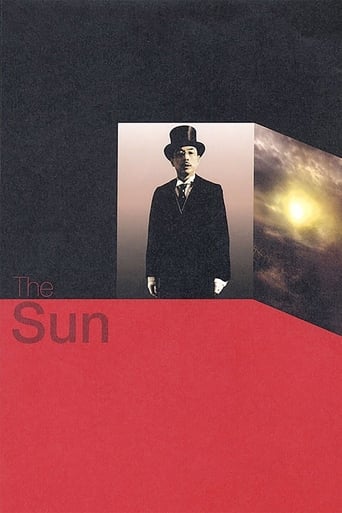bryanmillsfist
As an WWII buff, I was intrigued when I saw this film pop up on my Netflix recommence list. Alas, I ought to have taken the time to beforehand to look up the director. Alesandr Sokurov made the dreadful "Russian Ark". This film, while not nearly as bad as "Ark" or Malick's horrendous "Thin Red Line", suffers from a limp, aimless, script that is augmented by equally limp, wooden acting. The Americans in this film are a collection of stereotypes posing as characters. Richard Dawson in particular is awful. He appears to suffer from a case of macrocephaly which is seriously distracting. His massive head--quite unlike what MacArthur had-- makes him look like a mad scientist in an army uniform. His acting, the apposite of Tommy Lee Jones portrayal of MacArthur in "Emperor", is lifeless and quite unlike Douglas MacArthur.Issei does a solid enough job of portraying the Emperor. Who can pretend to accurately a man who is seen as a God and is kept largely out of the public eye? Unlike MacArthur, the actor here had little to go on in a character study.In view of this any actor who attempts to portray such a mysterious man has to be given a benefit of the doubt. That said, this is no equal to Ganz's brilliant portrayal of Hitler. Ganz put on one of the great acting performances of all time--at least the equal of Daniel Day-Lewis' Lincoln.I have one final critique and this goes for "Emperor" as well. For some reason when people make movies of the Pacific Theater they mention the A-bombs, but never the great many atrocities the Japanese committed in their 8 years of war. The Japanese were, in fact, the first country to employ WMD in WWII when they used bombs filled with bubonic plague on the Chinese. These weapons were developed by a special unit call Unit 731'. This unit committed horrors that matched those of Mengele and the Nazis. Then we have the Bataan Death March, the Rape of Nanking, and the general brutal occupations of Asian countries. The Japanese did far more than bomb Pearl Harbor. Ask the Chinese, who lost some 15 million citizens to Japanese aggression. Aggression that actually stretches back to 1931.(Even though the Sino-Japanese War did not officially begin until July of 1937.) To not mention Japanese barbarism and aggression on such a large scale is to akin to omitting the Holocaust when discussing the Nazis.
prekdahl
I would have given this film a higher rating based on the acting, concept, and mood, but I think that it is historically inaccurate. The film attempts a sort of dream like examination of the personality of Japanese Emperor Hirohito (Emperor during WWII), and the distance between his personality and his role in Japan. However, at the beginning of the film, Hirohito is meeting with his military who are saying that they will never surrender, and he agrees. This meeting in the film is happening after the Atomic bomb was dropped and American soldiers were already landed in Japan, almost into Tokyo itself. If I remember my history correctly, Hirohito broke the deadlock in the Japanese military, and was responsible for the decision for Japan to surrender. Also,this decision was made before Americans landed in Japan. I have read that the director of the film, Sokurov, has said that he is not aiming at historical accuracy in his films. But it seems to me that the real interest of this film is that it might be an "accurate", if subjective, reading of Hirohito's personality. If the film misrepresents such significant knowledge and personal action of Hirohito as this, how can we trust any of its representations about what Hirohito was like?
garnetdurham
Robert Dawson as MacArthur was a poor choice. He looks nothing like the real General, neither in height nor stature. In a famous photo of the period, MacArthur towers over Hirohito, even in His top hat, this framing suited the General's ego, and was not re-created in this film. Noticeably absent also, was the Generals favorite corncob pipe in this film, something the General was never without throughout World War 2.Other than that, the movie was a fascinating look at the Emperor's life, albeit from a very short time span. I thought this movie would have been much more interesting had it covered the start of the World War 2 with the Emperor receiving His Banzai's on His White Horse and seeming invincibility, to His ultimate fall from from a living God to That of a mortal being and a broken ruler.
Continuo-ity
Excellent film - very strange, with a minimal script and unusual colour.One point misunderstood by other reviews - Hirohito had that movement of the mouth. The Japanese friend I saw it with was bowled over by the portrayal of Hirohito.Great score, really adds to film - in other words not your typical Hollywood string slush-fest.The most interesting point for me related to a documentary on Hirohito I'd seen lately which contested this view of him being a helpless figure in the face of the military (though the government scene seemed to show him in control) and almost childlike. The evidence supplied suggested that he was very much in control, and his renunciation was solely done to get out of being held accountable. The most telling scene in this regard was the very last - the unspoken accusation is that he should have been the one to commit hari-kiri, not the announcer (? I think!).Highly recommended - but in the cinema! I'm not sure the colour would work as well on a TV.


